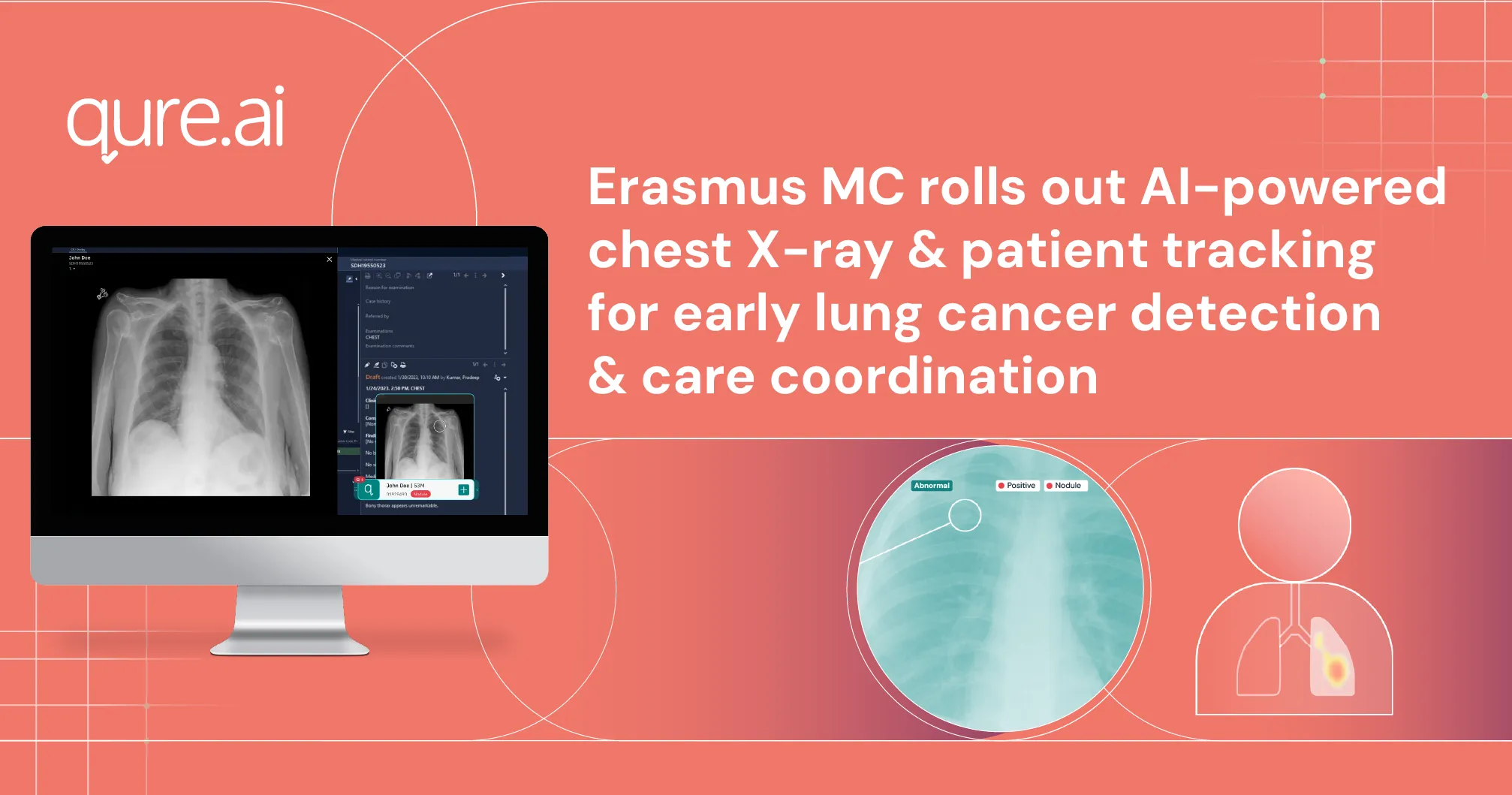100,000 patient chest X-rays to be proactively reviewed over the next year for incidental pulmonary nodules and cases tracked for follow-up
Back
Erasmus Medical Centre (MC), one of the largest and most authoritative scientific university medical centres in Europe, has extended its long-term collaboration with global innovator Qure.ai, by commencing an innovative Chest X-ray AI study. It aims to detect and follow-up Incidental Pulmonary Nodules (IPN) using state-of-the-art AI and digital healthcare coordination tools.
The CE-certified and FDA cleared Chest X-ray AI solution, qXR, has now gone live integrating into Erasmus MC’s existing radiology workflow. qXR automatically reviews patient Chest X-rays requested from multiple settings in the hospital environment including the Emergency Department, Outpatients and wider clinical specialties of Cardiology or Pulmonology. The AI provides a second set of eyes to radiologists, flagging the presence of lung nodules that require further investigation. The collaboration also includes the use of Qure’s new lung nodule management platform, qTrack to coordinate patient cases through smart prompts and custom notifications. Together, the aim is to detect lung cancer early and improve patient life outcomes.
Dr Jacob J. Visser, Radiologist, Chief Medical Information Officer & Assistant-Professor of Value-based Imaging of Erasmus MC states, “At present there is no proactive lung cancer screening programme in the Netherlands. This means that lung cancer cases present at a late stage when people start experiencing symptoms. Chest X-rays, one of the most performed radiological examinations in the world, provide an opportunity for earlier lung health surveillance, especially when leveraged with specialist AI.”
“Chest X-rays can reveal a number of findings, often incidentally, including pulmonary nodules. But the human eye can miss some details, perhaps 10-20%, when reviewing images traditionally, especially when tired or under pressure from high workloads. AI with high sensitivity such as qXR from Qure.ai aims to support clinicians by saving time and avoid missing clinically relevant findings,” Dr Visser continues. “Detection with chest X-ray is just one part of the patient journey – referral using CT is the next step to look in greater detail at any suspicious findings, and management of IPN patient cases must be considered to ensure no patients are lost along the way. This is where lung nodule care coordination tools come into play such as the Qure qTrack solution. That will be a valuable tool to support a dedicated Nodule Outpatient Clinic.”
“qTrack will give us an overview of IPN patients and when they need to be recalled or invited for further appointments by issuing prompts to clinicians” states Asabi Leliveld, Pulmonology Physician / Researcher of the Erasmus MC Nodule Outpatient Clinic. “We will also be working closely with Qure.ai on the ongoing evolution of qTrack providing advice and guidance to meet best-practice needs of IPN nurse navigators and nodule clinics.”
Mart Rentmeester, Radiology ICT Administrator at Erasmus MC states, “It has been a positive experience working with Qure.ai and it has been simple to integrate the AI solution into wider hospital IT ecosystem.”
“Working with Erasmus MC will help illustrate the power of chest X-ray AI to detect lung cancer early when there are no, or low uptake of, national screening initiatives. It will also help highlight the importance of radiography as a fast, non-invasive and relatively inexpensive option for lung heath surveillance. Each year there are close to 2 billion chest X-rays performed globally – reviewing chest X-rays opportunistically using AI holds the key to identifying small yet growing lung nodules that need further investigation. Early identification will help boost lung cancer patient survival rates,” states Bhargava Reddy, Chief Business Officer, Oncology at Qure.ai.
Erasmus MC, a city-based hospital in Rotterdam, is affiliated with Erasmus University. It sees thousands of people each day and delivers tertiary care services to the local patient population. The hospital has 1233 beds, 121 in ICU, and is home to the university’s faculty of medicine.
